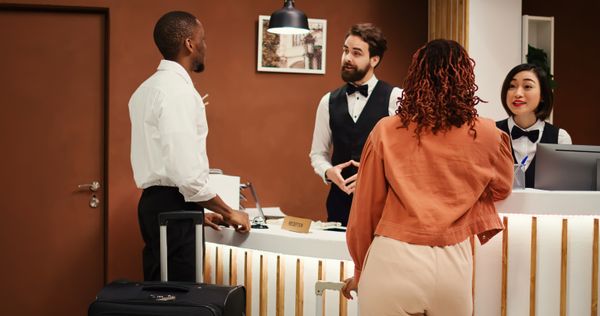In the hospitality industry, effective communication is the cornerstone of guest satisfaction. From the moment a guest makes a reservation to the time they check out, every interaction shapes their experience. As a hotelier, mastering the art of communication can lead to happier guests, positive reviews and repeat business.
If you're looking for ways to improve your hotel's relationship with guests, you've come to the right place. From day-to-day policies to general best practices, we've compiled a list of hotel guest communication tips to help you create more meaningful and memorable interactions. Improve consumer relations and guest satisfaction scores with these helpful pieces of advice.
1. Personalise the guest experience:
Tailor your communications to each guest's preferences and needs. Address guests by name, recognise special occasions such as birthdays or anniversaries, and anticipate their needs based on previous interactions or stated preferences. Personalisation creates a sense of care and attention to detail that guests appreciate.
2. Provide clear and timely information:
Transparency is key to building trust with your guests. Ensure that all information regarding room rates, amenities, policies and services is clearly communicated through your website, booking platforms and pre-arrival emails. Respond promptly to enquiries and provide accurate details to avoid misunderstandings.
3. Use multiple communication channels:
Address the different preferences of your guests by offering multiple communication channels such as phone, email, social media and messaging apps. Some guests may prefer traditional methods, while others may opt for digital platforms for quick and convenient communication. Be accessible across all channels to accommodate different communication preferences.
4. Implement automated messaging systems:
Streamline communication processes and increase efficiency by implementing automated messaging systems for common requests, confirmations and reminders. Use these systems to send personalised messages, booking confirmations and requests for post-stay feedback. Automation can save your staff time while ensuring consistent communication standards.
5. Train staff in effective communication skills:
Invest in training programmes to equip your staff with excellent communication skills. Teach them to listen actively, empathise with guests' concerns and respond professionally to feedback or complaints. Effective communication fosters positive interactions and helps resolve issues quickly, leaving guests feeling valued and satisfied.
6. Respond to feedback:
Encourage guests to provide feedback through surveys, comment cards or online reviews, and demonstrate a genuine commitment to addressing their concerns. Respond promptly to both positive and negative feedback, thanking guests for their input and outlining any steps taken to address their concerns. Proactive communication shows guests that their opinions are valued and helps build loyalty.
7. Anticipate guest needs:
Anticipate guests' needs and preferences based on their behaviour, requests or previous stays. Offer personalised recommendations for local attractions, dining options or services that match their interests. Proactive communication demonstrates attentiveness and enhances the overall guest experience.
8. Create a welcoming atmosphere:
Create a welcoming atmosphere by warmly greeting guests upon arrival, engaging in friendly conversation and offering assistance whenever needed. Train your staff to embody a welcoming attitude and to communicate with warmth and sincerity. A welcoming atmosphere sets the tone for the entire guest experience and encourages positive interactions.
Now that you have a list of tips for communicating with hotel guests, you can start building better customer relationships. Effective communication is a fundamental aspect of delivering exceptional hospitality experiences. By personalising interactions, providing clear information, using multiple communication channels and creating a welcoming atmosphere, hoteliers can increase guest satisfaction and loyalty. By incorporating these tips into your hotel's operations, you can enhance the guest experience and differentiate your property in a competitive market.








